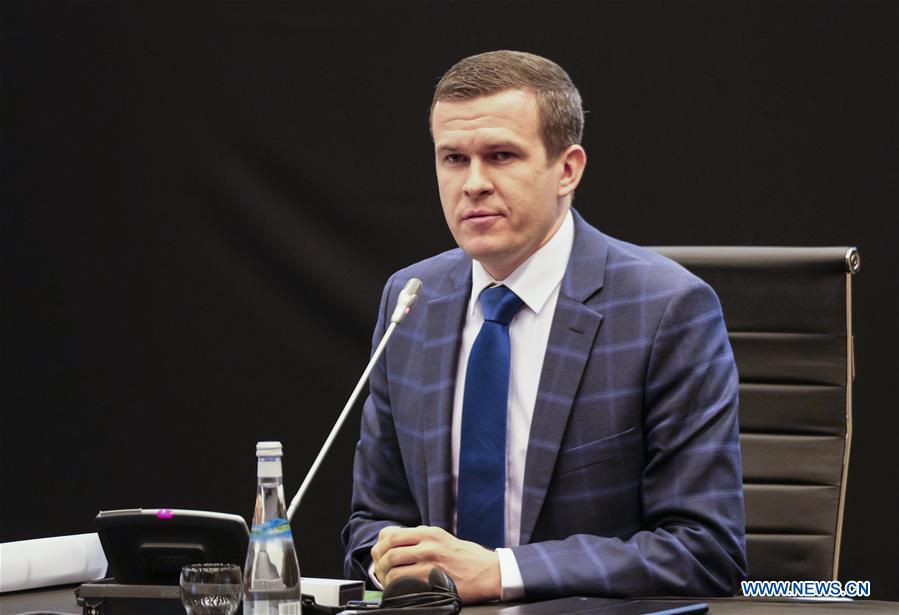
The World Anti-Doping Agency (WADA) president Witold Banka criticized the United States for politicizing anti-doping and called it hypocritical and double standard in a statement

Witold Banka speaks after being elected as the president of the World Anti-Doping Agency (WADA) in Katowice, Poland, Nov. 7, 2019. (Xinhua/Zhou Nan)
The United States House Committee on Energy and Commerce on Tuesday held a hearing titled "Examining Anti-Doping Measures in Advance of the 2024 Olympics," which disguised under its title a focus on a contamination case from 2021 involving 23 Chinese swimmers.
"The hearing sought to further politicize a relatively straightforward case of mass contamination that has been turned into a scandal by a small number of individuals, mainly in the United States," Banka said in the statement.
"WADA's job as the global regulator for clean sport is to strive to ensure that athletes of the world enjoy the same protections, rights and responsibilities whether they are from Boston or Beijing. When we review cases, we must always think about what is fair to those athletes, whatever their sport and whatever their nationality."
The world anti-doping chief quoted in the statement American politician Adlai E. Stevenson's saying "A hypocrite is the kind of politician who would cut down a redwood tree, then mount the stump and make a speech for conservation" when addressing the talks in the hearing, led by Travis Tygart of the U.S. Anti-Doping Agency (USADA), who claimed other countries and WADA were not playing by the rules when numbers showed themselves are far from fulfilling their due responsibilities in anti-doping.
"To this day, 90% of athletes in the U.S. do not enjoy the protections provided by the World Anti-Doping Code (Code). That is because the main professional leagues and college associations refuse to be brought in under the system overseen there by the USADA.
"Even the remaining 10% of athletes in the U.S. are not receiving the sort of support they deserve, a reality illustrated by the fact that 31% of American athletes under the Code were not sufficiently tested in the 12 month-period prior to the Tokyo Games.
"In 2023, USADA collected 7,773 samples from 3,011 athletes, according to its own annual report. It is quite a disappointing result, considering the country's population, high number of athletes and size of their Olympic team. With twice the budget, USADA collects less than half the number of samples as its counterpart in Germany. The French NADO also collects significantly more samples than USADA with a little more than one-third of the budget. USADA also collected less than the National Anti-Doping Organizations (NADOs) in China, Russia, Italy and Britain, as well as three international sports federations.
"Yet, to distract from its own failings, USADA tries to undermine U.S. athletes' confidence in the integrity of their rivals overseas. One wonders how USADA uses its annual budget of more than USD 31 million, apart from hiring lobbyists and spending its valuable time attacking WADA and weakening the global anti-doping system."
Banka took the example of the case of American athlete Erriyon Knighton to illustrate USADA's double standard. The promising sprinter tested positive for a banned steroid earlier this year but was allowed to compete in the U.S. national trials for the Paris Olympics after an arbitrator ruled this as a no-fault contamination case in mid-June.
"Without commenting on the merits, it is difficult to understand how USADA can declare in a statement that 'justice was served; in this case, given it had argued in the hearing that the analytical result was incompatible with meat contamination and had sought a sanction of four years against the athlete. It is particularly intriguing that USADA made this sudden U-turn in its opinion without even having seen the reasoned decision, which is not yet available.
"I cannot help but wonder what USADA would be saying if this had involved an athlete in China," Banka said.
Banka also pointed out that data collected in project involving law enforcement agencies and NADOs in Europe revealed that the U.S. is one of the world's largest markets for illicit steroids and performance-enhancing drugs.
The WADA president also expressed determination to build on global anti-doping systems that protect clean athletes and create level playing field independent of political influence.
